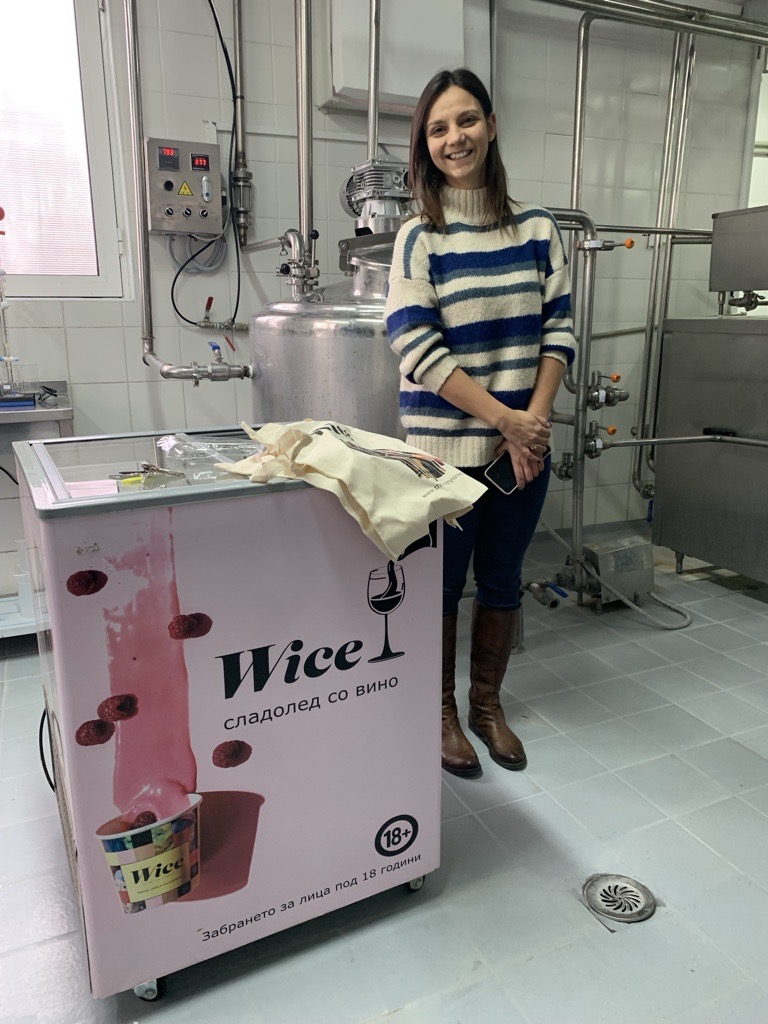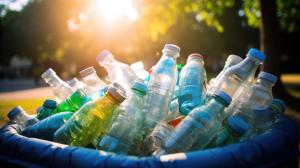Sofija Daceva remembers precisely the moment she had her “eureka” moment: “I love wine very much,” she says, “and I love ice-cream very much. In the summer of 2016 I was sitting at home eating ice-cream and suddenly thought: ‘Wouldn’t it be cool if this ice-cream had wine in it!’”
Born and brought up in Skopje, North Macedonia, the 28-year-old Daceva was, at the time, studying economics at Hult International Business School in London. After graduation she went to Warwick University for an MA in innovation and entrepreneurship, where she kept trying out her wine ice-cream recipes on campus.
 “I was popular as the alcoholic ice-cream girl,” she jokes. “I didn’t sell it, but asked people to offer donations and we saw that they were prepared to pay for it.”
“I was popular as the alcoholic ice-cream girl,” she jokes. “I didn’t sell it, but asked people to offer donations and we saw that they were prepared to pay for it.”
She was offered jobs as a risk assessor in the financial sector, but decided to pursue her dream instead. She returned to Skopje and began experimenting with recipes. “My parents really didn’t get it,” she says, “they were like ‘we didn’t send you to study economics in London so that you could come back here to sell ice-cream out of the back of a van.’”
One of the steepest challenges was the freezing point of wine, which is between -13 and -18 degrees Celsius depending on the alcohol content. Water obviously freezes at zero and that discrepancy meant consistency was a problem. Daceva, however, refused to give up on her dream. “We worked with private laboratories in North Macedonia, Türkiye and the UK and developed a technological process that raised the freezing point of wine.” That, she says, was the major breakthrough and she has applied for a patent to protect the intellectual property of the innovation.
The Macedonian Fund of Innovation gave her a €30,000 grant and she started ordering machinery from China. The wine ice-cream (called “Wice”) went through many iterations and subtle changes: she was using Macedonian wines – Merlot, Riesling and Chardonnay – and blending them with various fruits and flavours. It helped that Daceva’s childhood sweetheart, now husband, is a molecular biologist: “He’s very good at what he does, he gives me a lot of advice.”
“To begin with we didn’t want to have more than two or three flavours,” she says. “If you diversify too much, there’s too much choice and you have production problems.”
At the moment, her company, Matryoshka, produces tubs of “Riesling, vanilla & raspberries” and “Merlot, chocolate & sour cherry”, with a Chardonnay lemon sorbet also imminent. “In the future we’re planning to expand the offering, to develop more sorbets and add new wines with different fruit bases.”
The company now employs five full-time workers and three seasonal ones. Their expanding production facility in the hills outside Skopje can produce 300 litres of ice-cream an hour: they make 45,000 litres a year, with an average price of around €2.30 per 180 ml. unit.
It hasn’t always been easy. “The cold-chain process is more expensive and complicated than the normal supply chain. You need constant refrigeration – in transport, in retail spaces – and so people were asking us to pay 10% of their electricity bill to stock our product! There are very few distribution companies working with cold chain, and 50% of those already have contracts with large ice-cream manufacturers and they have an exclusive.”
The success of Wice, however, has meant that there’s now a demand from customers. “When our products sold out,” says Daceva, “we were then in a position to negotiate: ‘If you want more, you’ll have to pay on time’.” Wice is now available in around 120 outlets: the company supplies hotels, restaurants and cafés, and has an exclusive deal with the Tinex supermarkets.
There have been many obstacles along the way. One of the principle issues Daceva faces is a lack of highly-skilled food technicians. “Only about 50 people graduate a year in food technology in the whole of the country and it’s unlikely they’re going to come and work for a small company.”
Regulatory recognition has also been difficult because “the food standards agency didn’t know how to categorise us. They weren’t sure whether we were an alcoholic drink or a foodstuff!”
Customer behaviour, too, makes things tricky: “Temperature regulation is often out of our control,” says Daceva, “and we found people in supermarkets were sometimes leaving freezers open and damaging the product.”
The main lesson she’s learnt is that “in entrepreneurship you need to be outside your comfort zone all the time. It takes a lot of free time and social life, a lot of sacrifices, but you need to believe in an idea and know you are market fit.”
If an idea doesn’t work, she says, “you have to learn to kill your baby. It’s better to fail fast than slowly.”
It is, presumably, easier to kill a bad idea when you keep having good ones. On a visit to a vineyard a few years ago, Daceva saw vast piles of grape pomace (wine’s waste product of skin and seeds). Inspired by both the idea of a more circular economy and a business opening, Daceva decided to investigate. She discovered that the pomace contained fibre, vitamins and antioxidants, and could be used as a food-colouring and as a supplement. She founded a second start-up, Wise Group Ltd, and begun experimenting with the pomace. The firm now processes 15 tonnes of this waste product, reusing it as a healthy and natural source of vitamins and fibre.
“At the moment,” says Daceva, “we’re reinvesting everything we get. Maybe once we have the patent, we'll be able to change the business model a bit, outsource the manufacturing process, increase production, and get access to export markets.”
“Network is key,” she adds, “and knowing people is super important. I share ideas as widely as possible rather than keep them to myself because people from different cultures see problems from new angles. If the idea is good enough, it’s not that easy to steal it.”
_______________________________
The ETF's project "Skilling up the Western Balkan Agri-Food Sector” was launched in 2022 with a final conference in 2024. Sofija Daceva, Founder of Matryoshka LLC, demonstrated her ground-breaking wine ice-cream, Wice, during a site visit to the company's premises as part of the ETF's international networking event in Skopje, on 5–7 December 2023. More about the event: Skilling up the Western Balkans agri-food sector.




